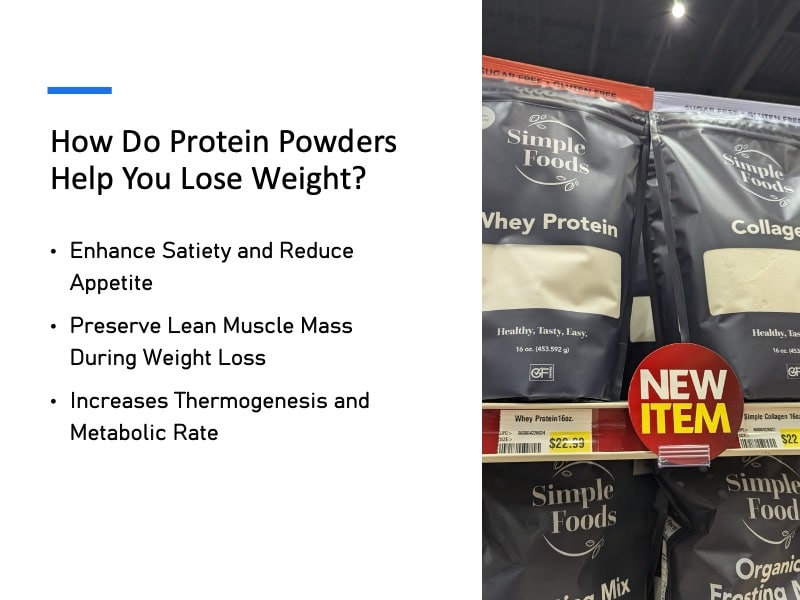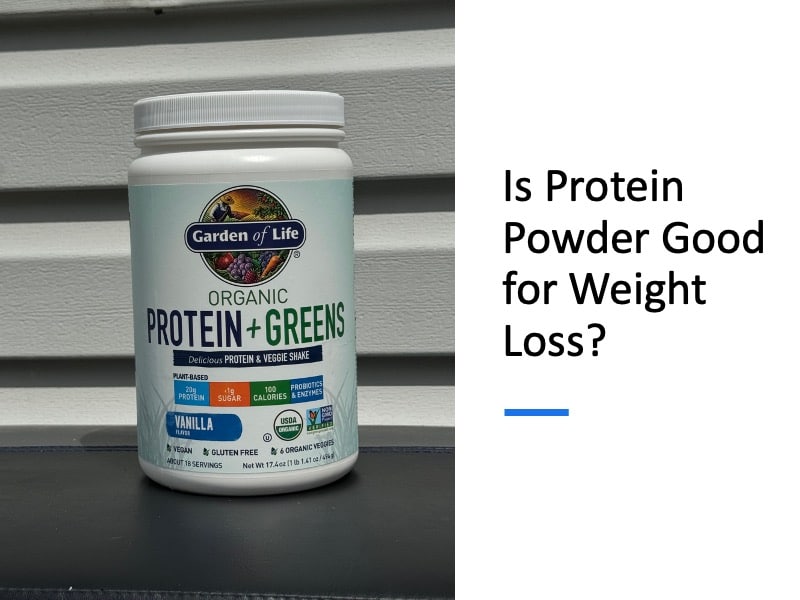Is Protein Powder Good for Weight Loss?
You want to lose weight, but hunger gnaws at you. Diets promise results, then leave you weak, drained, and craving more.
The truth is, protein powders can be your secret weapon—not just for building muscle, but for shedding fat while staying strong.
They curb cravings, preserve lean muscle, and keep your metabolism running like a well-tuned engine.
Research shows that a higher-protein diet leads to greater fat loss and better long-term weight management, and protein powders are a quick, effective, and healthy source of protein.
So, is protein powder good for weight loss?
Absolutely!
If you want to lose weight without sacrificing energy or muscle, the right protein supplement can help you get there—without the struggle.
How Do Protein Powders Help You Lose Weight?

Protein powders can be a game-changer for weight loss by helping you control hunger, maintain lean muscle, and boost metabolism.
Unlike fad diets that leave you feeling deprived, increasing your protein intake can naturally reduce cravings and promote fat loss without sacrificing energy levels.
Additionally, studies show that protein-rich diets increase thermogenesis, meaning your body burns more calories digesting protein compared to fats or carbohydrates.
Whether used as a meal replacement, post-workout recovery aid, or healthy snack alternative, the right protein powder can support a sustainable and effective weight loss journey.
Protein Powders Enhance Satiety and Reduce Appetite
One of the key mechanisms through which protein powders aid in weight loss is by increasing feelings of fullness.
Studies have demonstrated that higher-protein diets suppress hunger hormones while increasing satiety hormones, making it easier to consume fewer calories throughout the day.
A meta-analysis reviewing high-protein diets found that individuals consuming between 1.2 and 1.6 grams of protein per kilogram of body weight daily experienced greater appetite control and improved weight management outcomes compared to those consuming lower protein intakes (Leidy et al., 2015).
Additionally, whey protein has been shown to trigger the release of cholecystokinin (CCK) and peptide YY (PYY), two hormones that signal fullness and reduce food intake (Frestedt et al., 2008).
This makes protein powders, especially whey, an effective tool for curbing cravings and reducing overall calorie consumption.
Protein Helps Preserve Lean Muscle Mass During Weight Loss
Weight loss often results in a reduction of both fat and muscle mass.
However, research suggests that increasing protein intake while reducing calorie consumption can help preserve lean body mass and promote fat loss instead of muscle breakdown.
A systematic review of 35 randomized clinical trials involving over 1,900 participants found that whey protein supplementation led to significant reductions in BMI, body fat mass, and waist circumference while preserving lean muscle mass (Sepandi et al., 2022).
This is crucial because maintaining muscle mass helps sustain a higher resting metabolic rate, making it easier to continue losing weight or prevent weight regain.
Another study found that individuals supplementing with a whey-based protein formula lost significantly more body fat while maintaining more lean muscle mass compared to those consuming an isocaloric carbohydrate-based shake (Frestedt et al., 2008).
This suggests that incorporating protein powders into a calorie-controlled diet can optimize body composition changes, and help you lose weight more effectively.
Protein Increases Thermogenesis and Metabolic Rate
Consuming protein has a higher thermic effect of food (TEF) compared to fats and carbohydrates, meaning that the body burns more calories digesting and processing protein than other macronutrients.
Research shows that protein digestion accounts for approximately 20-30% of its calories burned as heat, whereas fats and carbohydrates have much lower TEF values (Hansen et al., 2021).
Additionally, studies have shown that individuals on higher-protein diets exhibit increased energy expenditure and fat oxidation, contributing to long-term weight management (Hansen et al., 2021).
By incorporating protein powders into a diet, individuals can slightly boost their metabolic rate, further enhancing fat loss.
What Is the Best Type of Protein Powder for Weight Loss?
Not all protein powders are created equal when it comes to weight loss.
Some formulations may be more effective due to their amino acid composition and digestibility.
Whey Protein
Considered the gold standard for weight loss, whey protein is rich in leucine, which promotes muscle protein synthesis and fat loss.
Whey protein hydrolysates, in particular, provide rapid absorption, making them ideal for post-workout recovery and appetite control.
Casein Protein
Unlike whey, casein digests slowly, providing a prolonged release of amino acids that helps maintain satiety for several hours. This makes casein an excellent option for reducing nighttime cravings.
Plant-Based Proteins
Vegan protein powders, such as pea, soy, and brown rice protein, have also been shown to aid in weight loss.
A recent study found that plant protein powders were effective in reducing BMI and overall body weight when combined with resistance training (Ballesteros-Torres et al., 2024).
How to Lose Weight with Protein Powder
Incorporating protein powder into your diet can accelerate fat loss, but it’s essential to use it strategically. Here are a few tips to losing weight with protein powder supplements:
- Use Protein Powder as a Meal Replacement: Replacing one meal a day with a high-protein shake (25-30g of protein) can help reduce overall calorie intake while maintaining muscle mass.
- Consume Protein Pre- or Post-Workout: Drinking a protein shake before or after resistance training can enhance muscle retention and recovery.
- Post-Workout Recovery: Drink 25-30g of protein after workouts to support muscle retention and fat loss.
- Snack Alternative: Instead of sugary snacks, opt for a low-calorie protein shake to curb cravings.
- Ensure a Balanced Diet: While protein is essential, it should be part of a well-balanced diet that includes fiber-rich vegetables, healthy fats, and complex carbohydrates for sustained weight loss.
By following these steps, you can effectively lose weight with protein powder while maintaining lean muscle and overall health.
Does Protein Burn Fat Without Exercise?
While protein alone won’t replace exercise, it plays a crucial role in fat loss by increasing metabolism, reducing appetite, and preserving muscle.
- Thermic Effect: Protein digestion burns 20-30% more calories than carbs or fats.
- Muscle Retention: Higher protein intake prevents muscle breakdown, keeping metabolism high.
- Fat Burning Hormones: Increased protein intake reduces insulin levels and promotes fat oxidation.
For individuals unable to exercise, maintaining a high-protein diet (1.2-1.6g/kg of body weight per day) can still lead to body fat reduction over time.
How to Choose a Protein Powder for Weight Loss
Choosing the right protein powder for weight loss requires understanding your dietary needs, fitness goals, and ingredient preferences. Here’s what to look for:
- High Protein Content & Low Calories: Look for at least 20-30g of protein per serving with minimal added sugars and fats.
- Complete Amino Acid Profile: Whey protein isolate and plant-based blends with BCAAs support muscle preservation while burning fat.
- Added Nutrients: Some protein powders, like Garden of Life Organic Protein & Greens, contain added greens and fiber to enhance satiety and digestion.
- Minimal Artificial Ingredients: Avoid excessive artificial sweeteners, colors, and fillers, which can hinder digestion and contribute to bloating.
For weight loss, whey protein, pea protein, and casein are excellent choices due to their digestion rate and ability to maintain lean muscle mass.
Best Protein Powder Supplements for Weight Loss
When considering protein powders to aid in weight loss, it’s essential to evaluate their nutritional content, taste, mixability, and overall effectiveness. Two of my favorite options are Garden of Life Organic Protein & Greens and Optimum Nutrition Gold Standard 100% Whey Protein.
For those seeking a plant-based option with added greens, Garden of Life Organic Protein & Greens offers a comprehensive nutritional profile, though some may find its taste and texture less appealing.
On the other hand, if you prefer a whey-based protein with a reputation for good taste and mixability, Optimum Nutrition Gold Standard 100% Whey Protein is a solid choice.
Both can be effective in supporting weight loss when incorporated into a balanced diet and exercise regimen.
Here’s a comparative review to help you make an informed decision.
Garden of Life Raw Organic Protein & Greens
As a professional basketball player and nutrition educator, I’m always on the lookout for clean, effective, and nutrient-dense supplements that support both performance and overall health.
Garden of Life Protein and Greens has been my go-to protein powder for years because it delivers more than just protein—it’s a complete nutrition package.
This plant-based protein provides 20 grams of organic protein per serving, sourced from sprouted brown rice, peas, chia, and legumes.
But what sets it apart is the addition of organic greens like spinach, kale, and broccoli, along with probiotics and digestive enzymes to support gut health.
It’s rare to find a protein powder that not only fuels muscle recovery but also boosts digestion, immunity, and energy levels.
I first discovered Garden of Life Protein & Greens at Walmart at a great price, and since then, it has remained a staple in my routine.
It is one of the best protein powders at Walmart due to its price their, and it is an excellent product no matter where you buy it.
Unlike many other protein powders filled with artificial additives, this one is USDA Organic, Non-GMO, and free from synthetic ingredients, making it one of the cleanest options on the market.
Whether I’m blending it into a smoothie or mixing it with water post-workout, it always provides a smooth, nutrient-packed protein boost without unnecessary fillers.
Last update on 2025-07-08 / This article includes affiliate links/Images via Amazon Product Advertising API. I may earn commissions on purchases made through these links.
Optimum Nutrition Gold Standard 100% Whey Protein
When it comes to high-quality whey protein, Optimum Nutrition Gold Standard 100% Whey has been my go-to choice for years.
Although I’ve focused on vegan protein powders in recent years, ON Gold Standard Whey is still one of the best protein powder supplements.
This whey blend delivers 24 grams of fast-digesting protein per serving, combining whey protein isolate, whey concentrate, and whey peptides for optimal absorption and muscle-building benefits.
One of the primary features of Gold Standard Whey is its smooth mixability and great taste.
Unlike many other protein powders that turn gritty or chalky, this one dissolves effortlessly in water or milk, making it perfect for post-workout recovery or a quick protein boost anytime.
The variety of flavors, including classic chocolate, vanilla, and strawberry, keeps things interesting while maintaining a balanced, natural taste.
Beyond muscle recovery, this protein powder also supports a healthy immune system and lean body composition, making it a reliable supplement for anyone looking to build strength, lose fat, or maintain a healthy diet.
Last update on 2025-07-09 / This article includes affiliate links/Images via Amazon Product Advertising API. I may earn commissions on purchases made through these links.
Final Thoughts: Are Protein Powders Good for Weight Loss?
Yes, protein powders can be an effective tool for weight loss, but they’re not a magic solution.
When used strategically—alongside a balanced diet and regular exercise—they help reduce hunger, preserve muscle mass, and boost metabolism.
Research shows that higher-protein diets increase fat loss while maintaining lean body mass, making protein powders a convenient way to meet daily protein needs.
The key is choosing the right protein powder.
Whey protein, like Optimum Nutrition Gold Standard 100% Whey, is fast-digesting and ideal for muscle recovery, while plant-based options, such as Garden of Life Protein & Greens, offer added fiber and nutrients for overall health.
Whichever you choose, incorporating a high-quality protein powder can make weight loss easier, more sustainable, and more effective.
Read Next: Plant vs. Whey Protein Supplements – Which is Better?
This website does not provide medical advice. This website site does contain affiliate links, and purchases may earn a commission.
Read my Medical Disclaimer, Review Disclaimer, and Publishing Policies for more details. Use of this site indicates acceptance of these terms.





